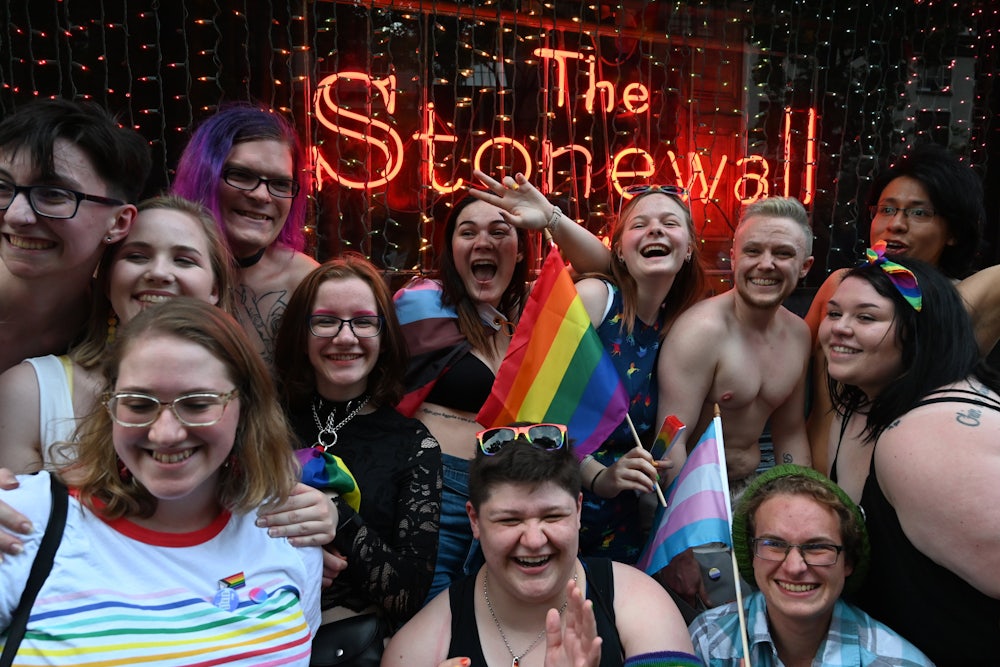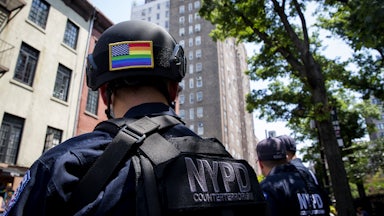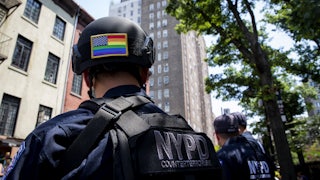This Pride month, as revelers hit the streets to celebrate LGBTQ history, Republican state legislatures are hard at work trying to erase it. And it’s not just epochal events like the Stonewall riots, or towering figures like Harvey Milk, that could be wiped from classroom instruction. In public schools in Tennessee, Arkansas, and Montana, it may soon become illegal even to mention Bayard Rustin, the openly gay co-organizer of the 1963 March on Washington, or educate kids about the AIDS crisis.
In May, Tennessee became the first state to pass what queer-rights advocates have branded as “Don’t Say Gay” laws, which either forbid the teaching of LGBTQ history in K-12 schools outright or allow parents to choose whether their children participate in lessons that include it. Within days, Montana followed suit. Yet another bill in Arkansas awaits the signature of the state’s Republican governor. Similar bills have been considered in West Virginia, Iowa, and Missouri, and even more proposals are percolating through red-state legislatures.
Akin to bans on the teaching of critical race theory, these laws seek to preserve the myth that the story of America is one of inexorable progress and unblemished virtue, that we stand exceptional among nations as the gleaming embodiment of democracy; they also imply that a great number of us don’t matter. In particular, legislation forbidding the teaching of queer history aims to ossify what remains of society’s moral disapproval of LGBTQ people and endangers queer youth susceptible to suicide.
“It is a false representation of the past, one in which LGBTQ people are imagined never to have existed,” said Anthony Mora, associate professor of history and Latinx studies at the University of Michigan. “The hesitancy to open up questions about the failures of the past—of not living up to the goals of the republic—is less about the past than about not wanting to change the present, to hold in place the status quo and not allow for real moments of debate and change.”
Mora’s group, the Organization of American Historians, and the American Historical Association released a joint statement in May condemning the recent spate of “Don’t Say Gay” bills, which the organizations say perpetuate homophobia, distort the historical record, and deprive students—queer and not—of a complete education. “Among the many dangers of these laws is that they will create a two-tiered system,” Mora said. “These bills would harm students by keeping them from learning about the complexity of our larger society and their place in it, depriving them of a fully rounded education.”
Politically, the bills reflect the resurgence of culture-war politics at the state level now that Republicans are out of power in Congress and the White House, and the religious right’s expanding moral panic over the advancement of LGBTQ rights. The laws in Tennessee and Montana, as with the bill in Arkansas, are in one sense narrow—designed, it seems, to invite legal challenges at a time when an overwhelmingly conservative Supreme Court is inclined to grant religious exemptions. In Tennessee, parents must now be given 30 days’ notice to examine any curriculum materials related to sexual orientation or gender identity, and can request their children be pulled from such instruction. Montana gives parents 48 hours to “withdraw the child from a course of instruction, a class period, an assembly, an organized school function regarding human sexuality.” A similar notification law in Arkansas requires school districts to tell parents in writing about “instruction of any kind” about “sex education, sexual orientation, and gender identity.”
In form, these bills are akin to religious exemptions allowing businesses to refuse service to LGBTQ patrons, and raise questions similar to those that the Supreme Court declined to address earlier this month in Fulton v. Philadelphia, as it did three years ago in Masterpiece Cakeshop: Namely, where does “religious liberty” end and nondiscrimination begin? Unable to stop our culture’s embrace of queer people, the right’s best chances now stand with exempting itself from the new social order.
And yet, in the last several years, six other states—California, New Jersey, Colorado, Oregon, Illinois, and Nevada—have passed laws mandating the teaching of LGBTQ history. “It reflects the increased polarization of the country,” said Marc Stein, a professor of history at San Francisco State University who specializes in LGBTQ studies. “We could end up in one of those moments where there’s an incredible degree of local variability in politics related to sexuality and gender.”
But the “Don’t Say Gay” laws that have passed are, in another sense, also broad to the point of absurdity—a testament to how hard it is to write a law discriminating against a group without mentioning it. If parents must be notified of any material that involves “gender identity” and “sexual orientation,” do teachers now need permission to tell kids George Washington was a man? Or that JFK married Jackie O?
“They are written in a way that purports to be facially neutral, but the goal obviously isn’t to limit or treat as extra sensitive information about the heterosexual spouses of important figures, or about the mannerisms of gender-conforming people,” said Jenny Pizer, law and policy director at Lambda Legal. “The unmistakable goal is to make it harder for schools to share true information about the contributions made by LGBTQ people so all students can better understand this aspect of human diversity.”
Vagueness and unintended consequences were the rationale Arizona Governor Doug Ducey, a
Republican, gave in April for vetoing
a “Don’t Say Gay” bill that would require parents to opt in rather than opt out
(as they do in the state for sex education). Iowa considered a similar opt-in
bill before its legislative session ended with the measure stuck in
committee.
Opt-in bills may seem like a minor variation on exemption bills, but they come closer to bans than one might think. In the same way far fewer iPhone users opt in to ad-tracking when presented with the choice, requiring students to opt in to LGBTQ-inclusive education would mean a significant number would decline by default. And as with sex ed, having to opt in reinforces the idea that learning about queer people is inessential or even dangerous.
“There’s this notion of contagion and contamination and recruitment in sexual politics,” Stein said. “We see examples of that with parents who don’t want their kids to see gay people in classroom contexts because they think the very exposure will encourage their children to transgress sexual and gender norms.”
But broader bans on teaching queer history are as active a threat as more tailored measures. Another bill in Tennessee sought to suppress any educational materials that “promote, normalize, support or address lesbian, gay, bisexual or transgender (LGBT) issues or lifestyles.” Republicans in West Virginia’s House of Representatives tried earlier this year to “forbid the teaching of sexuality in public schools.”
In fact, limitations on the instruction of LGBTQ topics already exist in six states, remnants of another era of moral panic over sexual and gender politics: the AIDS crisis under Ronald Reagan. In Alabama and Texas, students must be taught in sex ed that being gay is “not a lifestyle acceptable to the general public.” In South Carolina, you can’t talk about gay relationships outside the context of disease transmission. Louisiana, Mississippi, and Oklahoma have similarly homophobic restrictions on public education on the books.
In considering the threats and implications of censoring LGBTQ history, it can be easy to fall into the trap of thinking that teaching about queer oppression, misogyny, or racism is only to show America’s dark side, to expose the failures of our system of government. While the work of these movements remains unfinished, their successes are, in fact, that gleaming embodiment of democracy we should want the world to see.
“The triumphs of the Black, women, and gay liberation movements are three of the most uplifting stories about American democracy of the last 50 years,” said Charles Kaiser, author of The Gay Metropolis, a preeminent account of gay life in America. “The idea that ignorant people now think the most important thing they can do is suppress stories that tell you the best things about America is just repellent on every level.”




